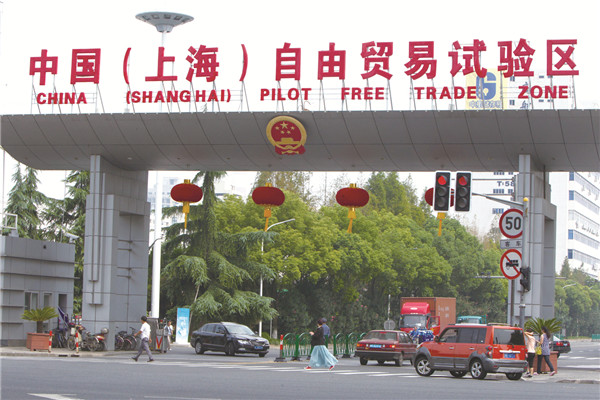The relentless pursuit for innovation
Updated: 2016-01-02 03:04
By Yu Ran and Wang Ying(China Daily)
|
|||||||||||
The past year proved to be an eventful one for China’s most populous city as its focus on developing and using cutting-edge technology led to significant progress in areas such as infrastructure and manufacturing. The year was also marked by landmark government policies aimed at enhancing the city’s competitiveness and fostering a culture of innovation that will ensure future success. With the dawn of a new year, China Daily USA highlights the most prominent events and achievements in 2015 that have further elevated Shanghai’s profile as China’s metropolis. Yu Ran and Wang Ying report.
The China (Shanghai) Pilot Free Trade Zone was expanded in April 2015, enlarging the zone from 28.78 square kilometers to 120.72 square kilometers. Gao Erqiang / China Daily
The expansion of the FTZ
One of the most significant events to take place in 2015 was the expansion of the China (Shanghai) Pilot Free Trade Zone (FTZ) in April, which signified how the city will continue to lead by example and spearhead progress in other free trade zones around the country.
Following approval by the State Council, a wider area of the city’s flagship economic and commercial hub, Pudong district, was incorporated into the Shanghai FTZ, enlarging the zone from 28.78 square kilometers to 120.72 square kilometers. The FTZ now covers new areas such as the Lujiazui Financial Area, Jinqiao Export Processing Zone and Zhangjiang High Tech Park.
According to official data, more than 400 enterprises in Zhangjiang High-Tech Park had opened about 1,000 free trade accounts to finance activities, mergers and acquisitions in overseas markets, and more than 180 venture capital firms have been set up in the park since April.
“Financial reforms have been providing impetus for innovation, with technology firms taking policy advantages to expand funding channels and save on operating costs,” said Zhu Min, deputy director of the zone’s management committee.
Furthermore, the FTZ will be looking to expand functions of existing free trade accounts, foster more overseas investments made by qualified domestic investors, increase back-flow channels of overseas renminbi investment and focus on supporting the legal establishment of overseas equity investment funds.
This move to boost the FTZ’s physical presence was matched with the introduction of several policies that seek to encourage more vibrant trade within the country. In February, the parallel car import scheme for 17 automobile dealers was launched across the country with eight of them operating in Shanghai.
Another notable achievement is the shortening of the “negative list”, which stipulates the sectors that are closed to foreign companies and investments. The original 190-sector list was shortened to 139, representing a concerted effort by authorities to further open the country’s doors to the world in order to fuel economic growth.
Shanghai Party Chief Han Zheng had stressed that additional development of the Shanghai FTZ will be aimed at four major areas — transforming government functions, introducing innovation to the financial system, providing impetus to transform Shanghai into an international finance, trade, shipping and economic center, and aiding the transformation of the Pudong district.
Today's Top News
Storm Frank batters northern Britain
Over 1 million refugees fled to Europe by sea in 2015
Germany to spend 17b euros on refugees in 2016
Demand booms for high-end financial talent
Abe expresses apology for Korean victims of comfort women
North China encounters gas supply shortage
Asian Infrastructure Investment Bank launched
Russia says it has proof of Turkey's support for IS
Hot Topics
Lunar probe , China growth forecasts, Emission rules get tougher, China seen through 'colored lens', International board,
Editor's Picks

|

|

|

|

|

|







